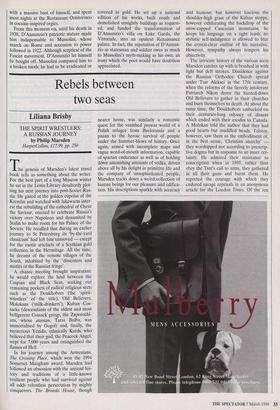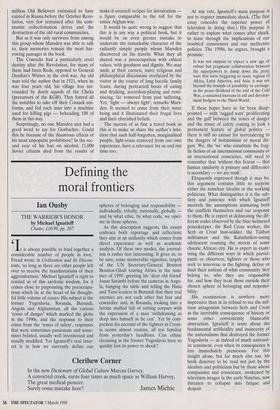Rebels between two seas
Liliana Brisby
THE SPIRIT WRESTLERS: A RUSSIAN JOURNEY by Philip Marsden HarperCollins, £1799, pp. 250 The genesis of Marsden's latest travel book tells us something about the writer. For the best part of a long Moscow winter he sat in the Lenin Library desultorily plot- ting his next journey into post-Soviet Rus- sia. He gazed at the golden cupolas of the Kremlin and watched with lukewarm inter- est the rebuilding of the cathedral of Christ the Saviour, erected to celebrate Russia's victory over Napoleon and dynamited by Stalin to make room for his Palace of the Soviets. He recalled that during an earlier journey to St Petersburg its 'by-the-yard classicism' had left him unmoved — except for the exotic artefacts of a Scythian gold collection in the Hermitage. All the time, he dreamt of the remote villages of the South, inhabited by the 'dissenters and misfits of the Russian fringe'.
A chance meeting brought inspiration: he would explore the land between the Caspian and Black Seas, seeking out remaining pockets of radical religious sects such as the Doukhobors (the 'spirit- wrestlers' of the title), Old Believers, Molokans (`milk-drinkers'), Kuban Cos- sacks (descendants of the oldest and most belligerent Cossack group, the Zaporozhi- ans, whose ataman, Taras Bulba, was immortalised by Gogol) and, finally, the mysterious Yezidis, ethnically Kurds, who believed that their god, the Peacock Angel, wept for 7,000 years and extinguished the flames of Hell.
In his journey among the Armenians, The Crossing Place, which won the 1994 Somerset Maugham award, Marsden had followed an obsession with the ancient his- tory and traditions of a little-known resilient people who had survived against all odds relentless persecution by mighty conquerors. The Bronski House, though nearer home, was similarly a romantic quest for the vanished prewar world of a Polish refugee from Byelorussia and a paean to the heroic survival of people under the hammer-blows of history. Once again, armed with incomplete maps and vague word-of-mouth information, capable of spartan endurance as well as of holding down astonishing amounts of vodka, driven above all by his delight in primitive life and the company of unsophisticated people, Marsden tracks down a weird collection of human beings for our pleasure and edifica- tion. His descriptions sparkle with accuracy and humour, but however luscious the shoulder-high grass of the Kuban steppe, however exhilarating the backdrop of the snow-capped Caucasian mountains, he keeps his language on a tight leash; no stylistic self-indulgence is allowed to blur the crystal-clear outline of his narrative. However, sympathy always tempers his objectivity.
The intricate history of the various sects Marsden catches up with is brushed in with light but deft strokes. Dissidence against the Russian Orthodox Church spread under Tsar Aleksei in the 17th century, when the reforms of the fiercely intolerant Patriarch Nikon drove the hunted-down Old Believers to gather in their churches and burn themselves to death. At about the same time, the Doukhobors embarked on their centuries-long odyssey of dissent which ended with their exodus to Canada. A Molokan told the author that they had good hearts but muddled heads. Tolstoy, however, saw them as the embodiment of, in the best sense, 'Christian anarchy' they worshipped not according to prescrip- tive dogma but in response to an inner cer- tainty. He admired their resistance to conscription when in 1895, rather than obey the Tsar's call to arms, they gathered in all their guns and burnt them. He reported the courage with which they endured savage reprisals in an anonymous article for the London Times. Of the ten million Old Believers estimated to have existed in Russia before the October Revo- lution, very few remained after the com- munist collectivisation drives and the destruction of the old rural communities.
But as it was only survivors from among this group whom Marsden was able to talk to, their memories remain the most har- rowing passages in the book.
The Cossacks had a particularly cruel destiny after the Revolution, for many of them had been Reds, opposed to General Denikin's Whites in the civil war. An old man told the author that in 1921, when he was four years old, his village was sur- rounded by death squads of the Cheka (precursors of the KGB). They forced all the notables to take off their Cossack uni- forms, and fed each man into a machine used for killing pigs — beheading 108 of them in this way.
Surprisingly, no one Marsden met had a good word to say for Gorbachev. Could this be because of the disastrous effects of his most unpopular prohibition? In the sec- ond year of his ban on alcohol, 11,000 Soviet citizens died from the results of make-it-yourself recipes for intoxication a figure comparable to the toll for the entire Afghan war.
It would be quite wrong to suggest that this is in any way a political book, but it would be an even greater mistake to underrate the remarkable character of the radiantly simple people whom Marsden discovered on his travels. What they all shared was a preoccupation with ethical values, with goodness and dignity. We may smile at their earnest, naive religious and philosophical discussions overheard by the visitor in the course of long bucolic family feasts, during protracted bouts of eating and drinking, accordion-playing and remi- niscing, far removed from past suffering. Yet, 'light — always light', remarks Mars- den. It seemed to come from their inner being and it illuminated their frugal lives and their cherished beliefs.
The success of as fine a travel book as this is to make us share the author's intu- ition that such half-forgotten, marginalised people, light-years removed from our own experience, have a relevance for us and our time too.



























































 Previous page
Previous page